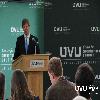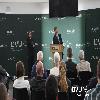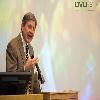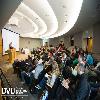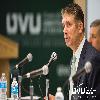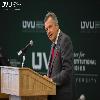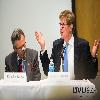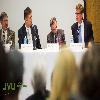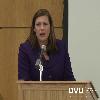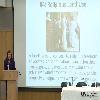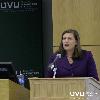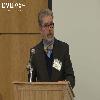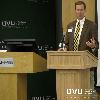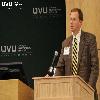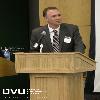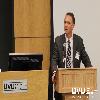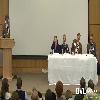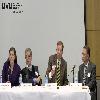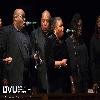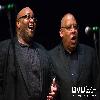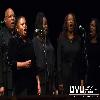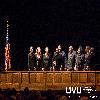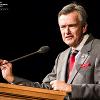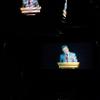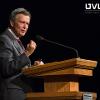American Presidents and Religious Freedom
Keynote Opening Address: The Quest for a Moral Presidency: Jimmy Carter, Progressive Evangelicalism, and the Religious Right
- Randall Balmer | Dartmouth Professor in the Arts & Sciences and Chair of the Department of Religion at Dartmouth College
In his keynote opening address, Dr. Randall Balmer, the Dartmouth Professor in the Arts & Sciences and Chair of the Department of Religion at Dartmouth College, discussed Jimmy Carter’s presidency and how religion and a prophetic voice helped launch a Democrat into the White House.
Carter’s improbable quest for the presidency, Balmer said, represented an attempt to restore a moral compass to Washington following the scandals of the Nixon years. Carter’s road to the White House received a boost from a brief resurgence of progressive evangelicalism in the early 1970s, but his presidency foundered in part because of opposition from his fellow evangelicals, Billy Graham, and the nascent Religious Right. After leaving the White House in 1981, Carter was freed from political constraints, and acted more fully on his prophetic convictions, thereby demonstrating that faith functions best from the margins of society and not in the counsels of power, concluded Balmer. Carter, Balmer opines, was the only person in our nation’s history for whom the presidency was a stepping stone to something greater.
Panel, U.S. Presidential Leadership On Religious Matters
- Religious Freedom in the Bush I, Clinton, and Bush II Administrations | Gene Schaerr, Constitutional Attorney
- Religion and Politics: Thomas Jefferson's other Metaphor | Matthew S. Holland, previous President, Utah Valley University
- The Presidents I served: Reflections on the Role of Religion in the Reagan and Obama Administrations | Douglas Kmiec, former Ambassador to Malta and Caruso Family Chair in Constitutional Law & Human Rights at Pepperdine University School of Law
- Mormonism and the Presidency: The Governors Romney, the Kennedy Paradigm, and the Religious Test Clause of Article VI | Randall Balmer, Dartmouth Professor in the Arts & Sciences and Chair of the Department of Religion at Dartmouth College
Panel, Recent Intrusions on Religious Freedom
- Religious Freedom Litigation in the United States | Hannah Smith, Senior Counsel at the Becket Fund for Religious Liberty
- What Caesar Cannot Seize | Matthew Franck, Director of the William E. and Carol G. Simon Center on Religion and the Constitution at the Witherspoon Institute
- Why For-Profit Corporations are RFRA Persons | Nathan Oman, Assistant Professor at the Marshall-Wythe School of Law, College of William & Mary
- The Threat to the Religious Freedom of Individuals and Religious Organizations when Religious Beliefs and Commitments are No Longer Seen as Having a Special Status | Alexander Dushku, Attorney and shareholder of Kirton McConkie
Constitutional Symposium on Religious Freedom Finale
- William Penn and Other Early Examples of American Religious Liberty and Practices | Rick A. Griffin, CCS Director
- Native American Dance | Camille Sine and Carl Moore
- The Battle Hymn of the Republic and Amazing Grace | The Calvary Baptist Choir
- In Diplomacy, Faith Can Never Be a Matter of Indifference | Douglas Kmiec, former Ambassador to Malta and Caruso Family Chair in Constitutional Law & Human Rights at Pepperdine University School of Law
The next speaker at the CCS Religious Freedom Finale was Douglas Kmiec, the Caruso Professor of Constitutional Law at Pepperdine University, former White House Counsel, and retired U.S. Ambassador.
Stressing the importance of interfaith diplomacy, understanding and cooperation, Kmiec told how he answered the call by President Obama to serve his nation in Malta, an island nation of strategic importance due to its proximity to the Middle East. As a practicing Catholic, Kmiec was encouraged by the president’s charge to visit the 365 churches on the island (one for each day of the year), a task that the Ambassador believed helped him to develop a great love for the Maltese people and their faith traditions.
When political unrest later threatened the lives of 100 U.S. diplomatic officials stationed in neighboring Libya, the U.S. Secretary of State turned to Ambassador Kmiec and the Maltese Embassy for assistance. Unaware of any other options, the Ambassador and his staff set out on a catamaran, to make the nine hour trip across the Mediterranean Sea to Libya.
Upon their arrival, they were met by Libyan guards, who entered the catamaran and smashed the cameras on board. Recalling that the guards were themselves confused and afraid, the Ambassador quoted the ship’s pilot, who said, “They don’t know who we are. They don’t know whether we’re on their side, and they don’t know whose side they’re on!”
Unable to assist the stranded U.S. personnel or to leave Libya, one of the Ambassador’s staff began showing the uneasy guards some pictures of her grandchildren. Soon everyone on the boat, including the guards, were sharing pictures of family members. These pictures established the common ground of shared humanity. After some deliberation, one of the leaders of the Libyan guards said that they were going to look the other way, and if the Americans happened to leave during that time, nothing would be done to them. In the end, Ambassador Kmiec was able to leave with the rescued 100 American diplomats, as well as 238 other refugees from various countries.
Ambassador Kmiec surmised both this event and his diplomatic experiences by referencing a picture of President John F. Kennedy kissing the forehead of his elderly and infirmed father. “Diplomacy,” Kmiec concluded, was just “a big word, a fancy word, for ‘love thy neighbor.’”
- From Being in the Spotlight to Living in His Light: How Religious Freedom has Impacted my Life as a Musical Performer | David Archuleta, singer-songwriter, musician, and actor
The concluding speaker of the CCS Religious Freedom Finale was American Idol finalist, and internationally-known singer, David Archuleta.
Unfolding his career from American Idol to the present, Archuleta highlighted the challenges that he faced as he attempted to reconcile his religious beliefs with the demands of the American music industry. Tensions arose when, against the advice of some music industry professionals and even members of his own faith, Archuleta announced that he had decided to serve a full-time, two-year mission for his church in the height of his pop stardom. In his explanation to his fans, he remarked: “I needed to do something that had nothing to do with me.”
A year after successfully completing his mission in the South American nation of Chile, Archuleta reported that his fidelity to his faith and religious principles had brought him peace and satisfaction both personally and professionally. To underscore his remarks regarding his appreciation for the freedom that allowed him to practice his religious beliefs, Archuleta performed memorable renditions of: “He Lives in You,” “Be Still My Soul,” and “Glorious,” to the delight of the thousands of onlookers who had braved the unusual winter-like conditions to attend the finale.


